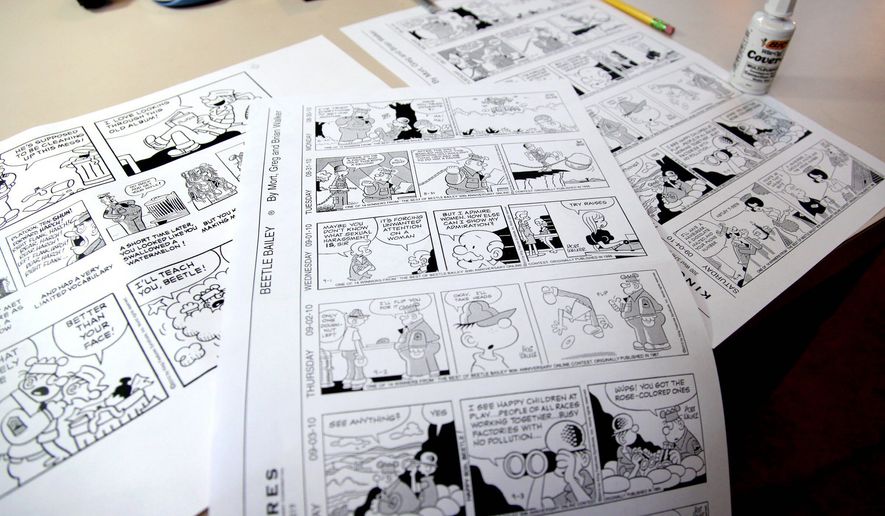STAMFORD, Conn. | Beetle Bailey is slouching toward retirement age, but the lazy Army private won’t be getting rest anytime soon from his tour of duty on newspaper comics pages.
The indolent wiseguy, whose popularity soared when he enlisted during the Korean War, turns 60 on Saturday.
Mort Walker has been imaging Beetle every day for all those decades and says he’ll continue with his creation until he’s no longer able.
“I don’t know how I’d be retired,” said Mr. Walker, 86. “I wake up every day with another idea.”
The genial gags by Beetle and the cast of characters — Sarge and his dog, Otto; Gen. Amos Halftrack; Miss Buxley and others — are followed seven days a week by readers in 1,800 newspapers, which is “astronomically huge,” said Brendan Burford, comics editor at King Features, the strip’s syndicating service.
Charles Schulz, who created and worked on the enormously popular “Peanuts” strip for nearly 50 years before his death in 2000, came close to Mr. Walker’s longevity. But “no one has worked on the same strip for 60 years with that kind of consistency,” Mr. Burford said.
“He’s definitely in a pretty seriously elite class,” he said.
King Features has been celebrating Beetle’s anniversary by running Sunday cartoons by Mr. Walker of Beetle re-enacting military events in history, such as celebrating the end of World War II or crossing the Delaware River with George Washington.
The commemorative strips put Beetle in different venues, but Mr. Walker said he has otherwise kept Beetle as is over the decades.
“He’s still pretty much lazy,” he said. “I haven’t changed him a tremendous amount because I think that’s his character that I want to keep. He represents the little man in all of us.”
“Beetle is the embodiment of everybody’s resistance to authority, all the rules and regulations which you’ve got to follow,” Mr. Walker said. “He deals with it in his own way. And in a way, it’s sort of what I did when I was in the Army. I just oftentimes did what I wanted to do.”
Beetle Bailey, originally called Spider, made his comic-strip debut as a smart-aleck college student on Sept. 4, 1950, in 12 newspapers, according to King Features. It considered dropping the strip at the end of Mr. Walker’s one-year contract, but when Beetle stumbled into an Army recruiting post in 1951 during the Korean War, the number of newspapers that picked up Beetle climbed.
Andrew Farago, curator of the Cartoon Art Museum in San Francisco, which is marking Beetle’s anniversary with an exhibit, said Beetle, his pals and their uncomplicated gags have become familiar friends to readers over the years.
“I think people find that really comforting,” he said.
Not everyone. Some feminists have been angry about the caricature of a dumb blond secretary, the curvaceous Miss Buxley, Mr. Walker said.
“The women’s right groups got so riled up against me they had a national agenda of attacking me,” he said.
Mr. Burford said that as an editor he wants artists “to work creatively and make people laugh and smile,” but had to restrain Mr. Walker at times.
“Sometimes you have to pull back on this leash,” he said. “As the rights of women increased, he became more sensitive to it.”
Still, as the newspaper industry retrenches, editors have not axed Beetle, Mr. Burford said.
“Newspapers don’t want to cut features that readers love,” he said.
Joe Schiesl, 72, a retired National Weather Service meteorologist in Manassas, Va., said he has been reading “Beetle Bailey” since he was in the ROTC and Air Force in the 1950s.
“The characters, you have those in any organization,” he said. “You have deadbeats like Beetle, and then you have people on their case like the sergeant.”
“I like it because it’s funny. It perks you up every day,” Mr. Schiesl said.
Mr. Walker, born in El Dorado, Kan., earned $1 for his first cartoon at age 11 during the Depression. It was a big raise from the 10 cents an hour he was paid delivering to a local drugstore, leading him to see cartooning as “where the real money is.”
He now works out of his spacious Connecticut home in a study stuffed with golf trophies, cartoon awards, figurines of Beetle and his Army pals, numerous photos of celebrities on the wall, Beetle refrigerator magnets and a clock with Beetle and other characters from the strip.
Mr. Walker, his two sons and Jerry Dumas, a colleague of 55 years, meet for an hour once a month to brainstorm gags for the comic strip. “Then we go to lunch and play golf,” he said.
Each of the four men proposes 30 gags, which are winnowed down until there are just enough strips to be used in a month. Mr. Walker rewrites them to try to improve the gags, he said.
Mr. Dumas, a veteran cartoonist who draws the strip Sam and Silo and drew for the New Yorker, said the “gag conference” has always been enjoyable.
“You sit down with a sheet of paper and pen. You just doodle,” he said. “You come up with a picture you haven’t come up with before. That’s the hard part.”
Producing a cartoon every day for 60 years isn’t easy, but Mr. Walker knows how to entertain Beetle’s millions of fans.
“I found that what they want is a laugh every day,” he said. “They want funny pictures.”




Please read our comment policy before commenting.